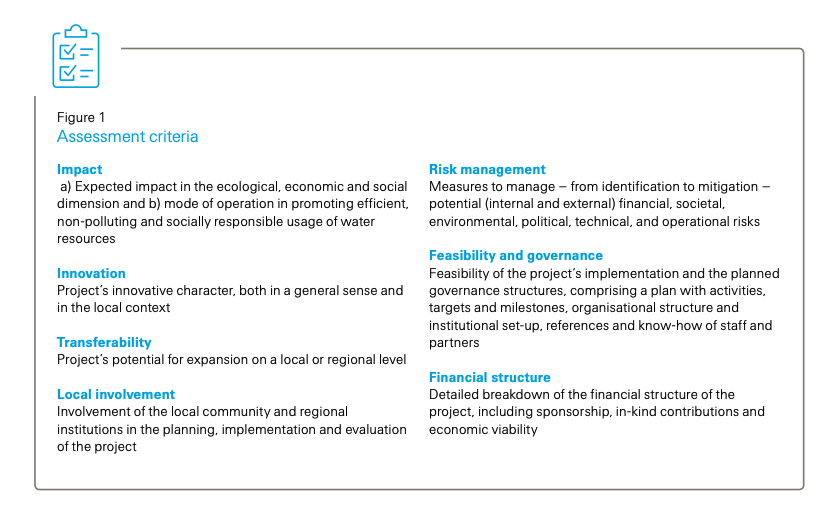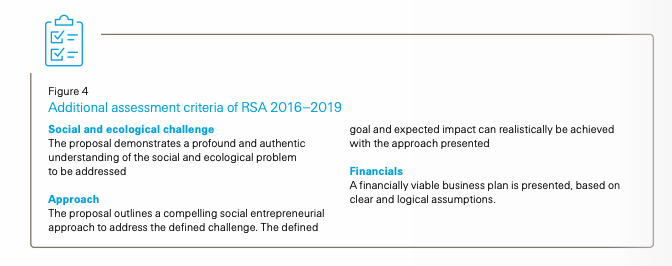How it all started: Launching an award scheme to raise awareness and foster dialogue around water challenges
The idea to launch the Swiss ReSource Award in 2002 was triggered by the findings of Swiss Re research on current trends in water usage and quality of drinking water, which were published in a focus report entitled “The water factor”. Water has always been a major factor in insurance, either as storms or diluvial rainfalls causing floods or unleashing landslides and mudslides or damage caused by droughts.
With the ongoing depletion and pollution of global water resources, the unchecked growth of world population and its unmet demand for safe drinking water, the trend has disastrous consequences for health and nutrition. It is gaining pivotal importance, threatening the natural environment, humanity and the economy. The impact of climate change is compounding the problem.
Responding to these vital concerns, Swiss Re committed to promoting awareness of water-related problems and expertise among its clients, employees and other stakeholders and – besides including specific criteria in risk assessment and transfer solutions – to promote constructive dialogues on water issues to help establish legal frameworks, guidelines and best practices.
With its ReSource Award, Swiss Re engaged in supporting eco-efficient, sustainable water initiatives launched and implemented by civil society, scientific, private sector and governmental organisations. It did so uninterruptedly for seventeen years, with over 2,500 reviewed proposals, 36 rewarded solutions, and more than USD 2.5 million allocated grants. With the exception of two organisations which received awards but to which contact could not be established when producing this publication, all other 34 are operational and have even substantially increased their activities.
Phase 1 (2002-2016)
The main ambition of the award, which was conferred annually from the beginning, was to support innovative measures for protecting precious water sources. The applicants were asked to submit proposals with a pioneering character in the local context regarding the cultural, institutional or technological dimension. By fostering a constructive dialogue, the goal was to raise awareness of the issue and to generate and exchange relevant know-how, thus helping to develop an effective framework and best practices for water management. The involvement of local communities – the beneficiaries - and regional institutions was another key requirement besides the scalability of the solution and its transferability to other locations.
The prize money of USD 150,000 was granted to one or several projects selected by an international jury with ten members. Winners were selected in a two-stage process. In the first stage, all submitted initial applications, on average more than 150 proposals annually, were assessed by a team of experts under the supervision of the jury committee constituted by the representatives of Swiss Re and the coordinator of the jury. Around two dozen preselected projects were then invited to submit a full proposal, which was evaluated based on predefined and publicised criteria (Fig. 1). Only the most promising proposals were forwarded to the members of the international jury, who made the final decision about the award winners.

Phase 2 (2016-2019)
Thirteen years after its launch, the management of Swiss Re Foundation, which hosted the International ReSource Award since its incorporation in 2011, evaluated the initiative’s scope, process and criteria together with the jury team. Based on the findings, the Foundation aligned the concept and design of the ReSource Award with a stronger emphasis on nurturing earlystage social enterprises.
Furthermore, the award scope was broadened from watershed to water management, and the process and some of the criteria were modified (see Fig. 2). The initiative was renamed the “International ReSource Award for resilience in sustainable water management” (RSA), reflecting this evolution.
Beginning with the 2016 award cycle, Swiss Re Foundation invited social purpose organisations with start-up businesses that promote sustainable management of water resources, or well-developed ideas for such businesses, to apply.
- Social and ecological challenge: The proposal demonstrates a profound and authentic understanding of the social and ecological problem to be addressed
- Approach: The proposal outlines a compelling social entrepreneurial approach to address the defined challenge. The defined goal and expected impact can realistically be achieved with the approach presented
- Financials: A financially viable business plan is presented, based on clear and logical assumptions.
Selected by a jury of eleven water and business experts, the three award finalists received USD 25,000 to develop their business prototypes over a six month incubation period. During this time, Swiss Re staff and Swiss Re Foundation partners provided them with mentoring tailored to their specific developmental stage and needs. The winner selected by the jury’s majority decision received an additional USD 75,000 and access to relevant knowhow and coaching to build the envisioned enterprise over the following three years. With this approach, Swiss Re Foundation aimed to nurture social innovations in their precarious early stages by giving entrepreneurs not only financial resources but also the opportunity to collaborate with experienced Swiss Re experts and other Foundation partners.

Learnings from 17 years
Target group and price money
Due to the fact that early-stage projects bear many risks, and positive revenue might be generated only in the long term even though positive social impact can be achieved immediately, it is very difficult for social enterprise start-ups, in particular those operating in emerging markets and developing economies, to acquire seed money, even relatively small amounts. An award scheme such as the RSA, providing grants in the range of USD 25000 – 75000, could add the most value for those organisations that either want to check the feasibility of the planned intervention (= proof of concept) or are in the prototyping phase. According to the feedback of the finalists of RSA cycle 2016–19, the money they received to further develop their business model prior to the final selection was also helpful for them to bridge their funding gap.
Though the awarded grant money might be relatively modest, its release should be results or milestone-based. This is less a risk management measure than an effective action to promote anticipatory financial planning. In some countries, the legal form of the grantee can be a challenge or even a barrier to transfer of the grant money. Therefore, it is advisable to consult internationally active financial institutions.
Submission and evaluation
The terms of submission of an award or a similar small grant scheme for social enterprise start-ups must be transparent and comprehensible. A question-based guidance and the underlying evaluation criteria including their weighting have to be logical, thus helping an applicant to submit the proposal in a complete, consistent and structured way. Ideally, through the compilation of the submission, a self-critical reflection about the project’s goals and feasibility will be provoked. Questions on project-specific social, environmental, regulatory as well as operational and technical risks are essential both for the applicants to deduce mitigation measures and for the grantor to identify potential default risks.
Besides asking for a definition of the target groups and a description of their needs being met by the intervention, a project proposal should ideally contain some plausible estimates of the numbers of potential direct and indirect beneficiaries.
A web-based submission and assessment tool is very useful, allowing a) applicants to enter their proposals in a user-friendly, well-guided and safe way, also given that the submission should not be exclusively in writing, e.g. visualisations, audio and video recordings should be uploadable, b) independent experts (e.g. an international and interdisciplinary jury) to assess the submissions based on clearly defined criteria and c) administrators to generate statistical evaluations and specified reports.
Composition of assessors and their involvement is crucial. Multi-actor, multi-professional and multi-cultural perspectives will help to cover and discuss the relevant questions and subjects related to a submission, and finally to make a broadly-based and fair decision on whether or not to support a project. In addition to the assessment of the written submissions, it is advantageous to conduct interviews with the applicants.
